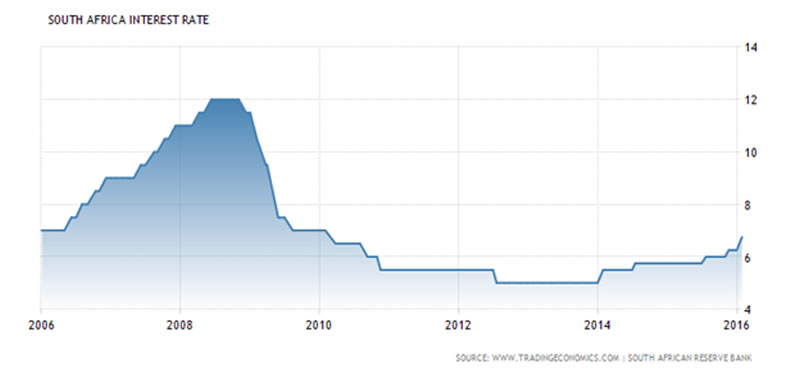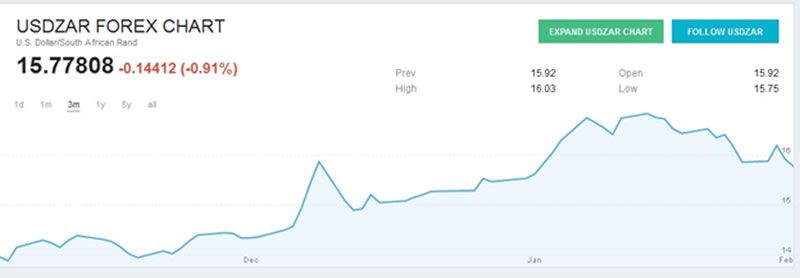South Africa Economy from Hero to Zero
Economics / Africa Feb 04, 2016 - 06:01 PM GMTBy: AnyOption
On 19 November 2015, the South African Reserve Bank’s Monetary Policy Committee (MPC) decided to hike interest rates by 25-basis points from 6% to 6.25%. The forecast for the next interest-rate meeting on 28 January 2016 was 25-basis points, for an overall interest rate of 6.5%. The SARB surprised everyone when it hiked interest rates by 0.5% to the prevailing interest rate of 6.75%. This bold initiative is one of the more drastic steps that can be taken by the authorities when currencies are depreciating rapidly. This is a way to arrest further declines in the value of the ZAR on the international stage.

The effect of raising interest rates domestically acts as an enticement to foreigners to purchase South African Rands and enjoy high interest-rate earnings at financial institutions in the country. It acts as a disincentive against selling the currency, and is regarded as an effective means of attracting foreign direct investment. However, the rapid depreciation of the South African Rand of late has far outstripped the 6.75% interest rate that is being offered to protect the currency. Take a look at the below graphic which reflects the sharp depreciation of the ZAR vs USD:

The currency pair was last trading at 15.77808 to the USD from over 16 to USD in the prior session. The US dollar appreciated by almost 40% against the ZAR in 2015, from 11.37 a year ago to its current rate of 15.77808 today. The USD has traded at 16.84 to the ZAR at its strongest point, and 0.67 at its weakest point. But there are storm clouds gathering on the horizon for the South African Rand, and they come from none other than the World Bank. For 2016, the World Bank as downwardly revised the growth forecast for the South African economy to just 0.8%. What this means is that the South African economy is stagnating, and possibly heading towards a recession. Earlier on, the World Bank forecast a GDP growth rate of 1.4% for 2016, but that has been slashed by 0.6%. And the forecast for 2017 is none too optimistic either – down from 1.6% to 1.1%. In terms of what this means in perspective, consider that sub-Saharan Africa is expected to grow at a rate of 4.5% between 2016 and 2017; South Africa's estimated growth rate is 0.8% for 2016 and 1.1% in 2017.
So what is causing such economic paralysis in South Africa?
South Africa, like so many other emerging market economies is staring down a barrel because of China weakness. The vast majority of mining, agricultural and energy outputs in South Africa was previously consumed by China. With exports to China dramatically reduced, revenues for South African multinational conglomerates have all but evaporated. Combine that with the severe drought affecting large parts of the country, and it is clear why economic stagnation has gripped the country in its clutches. Unlike the US which has an unemployment rate of 5%, South Africa's unemployment rate is 25%. This means that 1 in every 4 people looking for a job cannot find one. But that does not tell the whole story; the actual number of people who have given up looking for work is closer to 35%. That means 1 in 3 people feels so despondent about the economy that they have given up looking for work. To complicate matters, the inflation rate is expected to hit 7% within the next 11 months. That is indeed a worrying sign in an economy with a rapidly depreciating currency, stagnant wages and rising costs.
- Property demand will decline owing to rising interest rates and slack economic growth this year. This means that first-time property buyers will suffer as a result of higher mortgage payments.
- The prime rate is expected to hit 11.25% by Q2 2017 (+1% from the current rate of 10.25%).
- South Africa reported declines in new vehicle sales of 6.9% (Year-on-Year) for January, and this is expected to continue throughout the year.
- Sentiment vis-a-vis emerging market economies and particularly South Africa is exceptionally bearish and this does not bode well for economic growth prospects.
- Various credit ratings agencies have downgraded South Africa's status owing to mismanagement of the economy by the Finance Minister and the President.
- The consumer confidence index is low and economic performance is sub optimal.
But what does it mean when interest rates are rising in South Africa? Is this a good thing or a bad thing? The truth is it depends on your personal economic situation. If you are in debt and you owe money on your credit card or on your mortgage repayments or on your vehicle college tuition, increased interest rates are not a good sign. It means that you're going to be paying a lot more over time to clear your debts. However if you have money stuck in the bank, an extra 0.5% interest will certainly be an attractive proposition for you. The reason for increasing interest-rate is to combat high inflation. Too much money is circulating throughout the South African economy and the only way to get rid of that money is to encourage people to deposit their money to arrest inflationary pressures. High interest rates are part of a quantitative tightening policy adopted by the monetary policy committee. For now, it is unclear how the South African Rand will appreciate or depreciate vis-a-vis the USD because the factors that impact upon this currency are largely based outside of South Africa's borders.
Anyoption™ is the world's leading binary options trading platform. Founded in 2008, anyoption was the first financial trading platform that made it possible for anyone to invest and profit from the global stock market through trading binary options.
Our goal here at Market Oracle is to provide readers with valued insights and opinions on market events and the stories that surround them.
Website anyoption.com
© 2016 Copyright Anyoption - All Rights Reserved
Disclaimer: The above is a matter of opinion provided for general information purposes only and is not intended as investment advice. Information and analysis above are derived from sources and utilising methods believed to be reliable, but we cannot accept responsibility for any losses you may incur as a result of this analysis. Individuals should consult with their personal financial advisors.
© 2005-2022 http://www.MarketOracle.co.uk - The Market Oracle is a FREE Daily Financial Markets Analysis & Forecasting online publication.



